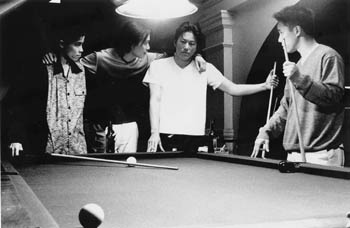![[Metroactive Movies]](/movies/gifs/movies468.gif)
[ Movies Index | Show Times | Silicon Valley | Metroactive Home | Archives ]
A Better 'Tomorrow'
Did MTV Films and Paramount Pictures drop the ball on 'Better Luck Tomorrow'?
By Todd Inoue
IN JUSTIN LIN'S groundbreaking film Better Luck Tomorrow, Asian American scholars study hard, get good grades and commit murder. The characters deal with the consequences that come with power, popularity and nihilism. Like Larry Clark's Kids, they exist in an environment free of adult supervision, and they live by the tragic, amoral decisions they make.
"The theme of Better Luck Tomorrow is identity," says director Lin. "You have to develop your identity, whatever you're trying to grow into. If you adopt an identity and don't have the patience to grow into it, the identity can overtake you."
The four types in Better Luck Tomorrow--Sung Kang (the silent enforcer), Jason Tobin (the emotionally unstable loose cannon), Roger Fan (the conniving valedictorian) and Parry Shen (the overachiever)--offer a distinct change from previous Asian American film archetypes: usually the kung fu master or superperfect doctor on ER. The film doesn't provide the most positive portrayal of Asian folks, but it transcends race and raises questions about a generation of latchkey kids who carry full course loads but are morally bereft.
Positivity has been a constant source of debate since Lin's film rattled sensitive viewers at the Sundance Film Festival and was picked up by MTV Films and Paramount for distribution. Lin welcomes the debate. "We have to redefine what positive means," he says. "It would only be negative if I didn't do my job and the characters in Better Luck Tomorrow were one-dimensional caricatures. They're 3-D. They're people with feelings and flaws--that's positive."
Challenging perceptions is Lin's responsibility as a director hyped as one the "top 10 to watch" in Variety. Lin's vision of high school life should be seen outside of the art house and Asian American film festival circuit, but chances are you've never heard of Lin or Better Luck Tomorrow. MTV Films' other releases (mostly teen fair like Save the Last Dance, the Britney Spears vehicle Crossroads and the megahit Jackass) were flush with commercials, previews, bus billboards, commercial tie-ins and advertising campaigns. Aside from a two-minute feature on MTV's Total Request Live and articles in Asian American magazines, MTV and Paramount's marketing campaign behind BLT, which opened last weekend in San Jose, is lackluster at best.
Lin defends his distributors' handling of the project ("They are doing a good job, but they're being realistic") and points out that his film has to earn a marketing push.
"Here's the hypocrisy of the system," Lin explains. "You have How to Lose a Guy in 10 Days--big stars, billboards, tons of commercials. You open 3,000 screens and average $3,000. You make $9 million. For an independent film, there are no billboards, no commercials. You're in 10 screens, and they want you to do $25,000. It happens with all the independent films being released."
To ensure that the numbers will be there, they have set up guerrilla-marketing task forces in major cities, similar to "bring out the vote" demonstrations. Organizations are buying out screenings in advance and distributing tickets themselves. They hope that Better Luck Tomorrow shows Hollywood studios that an Asian American filmgoing demographic exists.
Lin was pressured by potential investors (some of them Asian American) to change the characters to whites or Latinos or to cast Macaulay Culkin. Lin sat in marketing meetings where Asian Americans don't even show up on the pie chart as potential targets.
"They say, 'Asian American spending patterns are exactly the same as [those of] middle-class Caucasians,' so they consider Asian Americans as Caucasian," Lin says. "But if we know that, and [we] put our dollars into films we want to see and support, they will listen, and they will make more films like that. If you want to see a film that's outside the box, that takes risks, you should support a film like this."
A lot is riding on Better Luck Tomorrow, and the repercussions will be felt far beyond the cineplex. Eric Byler, director of Asian American buzz film Charlotte Sometimes, says that the success of BLT not only affects distribution of his film, it affects all yet-to-be-released and yet-to-be-filmed Asian American features. Hollywood execs are watching BLT closely, wallets in hand.
"Industry executives in Hollywood don't expect Asian Americans to support their own films, as African Americans and Latino Americans do, based on our track record," says Byler. "This is the year to prove them wrong. ... If we don't see Asian Americans in theaters in 2003, consider it safe to assume we never will."
[ Silicon Valley | Metroactive Home | Archives ]
![]()

Fearsome Foursome: Daric (Roger Fan) recruits a reticent Han (Sung Kang) into a scheme as Virgil (Jason Tobin, left) and Ben (Parry Shen) watch in 'Better Luck Tomorrow.'
Better Luck Tomorrow (R; 101 min.), directed by Justin Lin, written by Lin, Ernesto M. Foronda and Fabian Marquez, photographed by Patrice Lucien Crochet and starring Parry Shen, John Cho, Sung Kang, Roger Fan and Karin Anna Cheung, currently plays at Camera One and Camera Three in San Jose.
Send a letter to the editor about this story to letters@metronews.com.
From the April 17-23, 2003 issue of Metro, Silicon Valley's Weekly Newspaper.